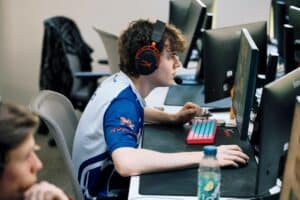Chichester academic co-creates system for defining ‘elite’ in esports

A classification system to define ‘elite’ in esports has been created by an academic from the University of Chichester alongside colleagues from two other universities.
The research paper “Defining Elite in Esports: A Scoping Review” was published in the International Review of Sport and Exercise Psychology and responds to the growing esports industry and research on high-performing esports athletes and competitions, but a lack of clarity around defining what ‘elite’ means in esport.
The paper is a collaboration between Dr Benjamin Sharpe, Senior Lecturer at the University of Chichester, and Dr Dylan Poulus, of Southern Cross University in Australia, alongside Dr Patricia Jackman of the University of Lincoln, and Christian Swann and Kyle Bennett, also of Southern Cross University.
This paper builds directly on the hugely impactful ‘Defining elite athletes: Issues in the study of expert performance in sport psychology’ in Psychology of Sport and Exercise, which to-date has received over 1,200 citations since its publication in 2015.
The authors proposed a two-step process for an elite classification system, which considers a player’s highest level of competition and success at that level, as well as the prominence of the esport in question. The idea was to provide researchers and practitioners with valuable guidance for classifying elite esports athletes.
In the paper, the academics said: “Our team, which included experts in elite esports encompassing researchers and practitioners, developed the working classification system and associated guidelines to directly address some of these challenges and to provide context-specific guidance on defining elite in esports. In devising the classification system, we deliberately used the term ‘working’ to emphasise its provisional nature and highlight that it is our intention that it serves as a stepping stone for future research and that can be refined and progressed to develop a more stable framework.”
The academics reviewed 63 esports studies and found four sub-categories formed around the level of competition; international competitions; country or regional level (e.g. Korea, the UK and Europe); national second-tier leagues or below; and unspecified competitions or leagues. They found the first two categories could be defined as ‘elite’.
They also found three sub-categories for elite esports athletes were developed based on their professional status. Playing for a professional organisation was the most frequently cited sub-theme, income or level of involvement in esports was also used to justify their sample as being elite, and membership with a professional esports body or association was cited less frequently.
In-game achievement or ranking was also used, and one study reported that any in-game rank was sufficient to be defined as an expert, whereas 15 other studies used a certain in game rank to separate the elite from sub-elite esport athletes.
Domain experience comprised two sub-categories: experience and training. Experience included studies that reported an esport athletes’ length of time playing their esport, or the number of hours esports athletes had recorded playing their esport.
After reviewing the studies on ‘elite’ esports, the authors devised a system with criteria and questions to define ‘elite’ in esports.
The classification system is in two parts, and the first looks at the success and achievements of the athlete, looking at the player’s highest participation in their esport, how long they’ve participated in that highest competition standard and how much success the player has achieved.
The second part looks at the prominence and competitiveness of the esport in question, and asks: How big is the pool of participants in the esport? How widely played is the esport? How long has the esport been played competitively? How big are the prize pool and audience for the esport?
The answer to these questions and criteria can define whether a player/e’athlete can be defined as ‘elite’.
The authors said: “Researchers are encouraged to use the working elite classification system to classify their esports samples and utilise the guidelines for elite esports when reporting on elite esports samples. Adherence to these reporting guidelines can help peer reviewers and editors evaluate the validity of samples deemed elite and can assist future researchers in comparing findings across elite esports samples.
“The proposed elite classification system should be considered a starting point to be refined once the esports industry matures within the sporting landscape.”
You can read Defining Elite in Esports A Scoping Review here.





